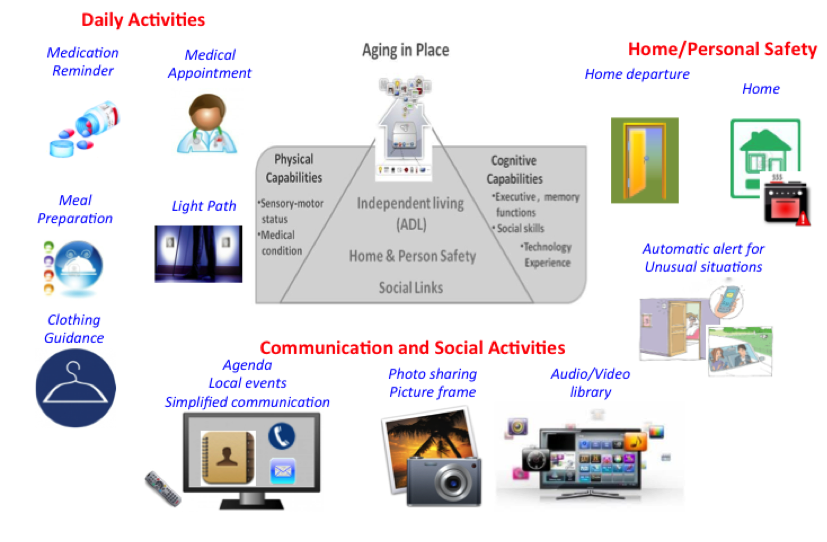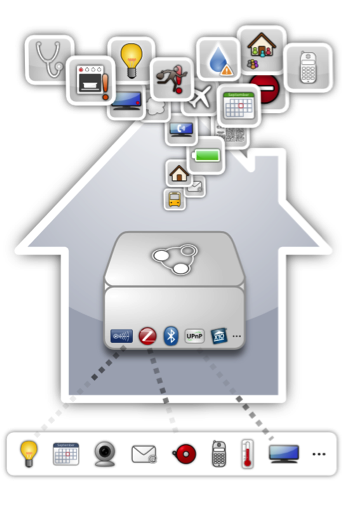
The HomeAssist project proposes a systemic approach to introducing an assisted living platform at the home of for older adults. To do so, we formed a trans-disciplinary team that allows (1) to identify the user needs from a gerontological and psychological viewpoint; (2) to propose assistive applications designed by human factors and HCI experts, in collaboration with caregivers and users; (3) to develop and test applications designed and developed by software engineers; (4) to conduct a field study to assess the benefits of the platform and assistive applications, in collaboration with caregivers, by deploying the system at the actual homes.
The HomeAssist project is based on a platform, namely the DiaSuiteBox, and a suite of tools, namely DiaSuite, that have been designed, developed and tested by our research group at Inria. The DiaSuiteBox includes a dedicated integrated development environment that enables applications to be developed quickly and safely. This technology has been successfully applied to a variety of domains where environments consist of networked objects that need to be orchestrated.
Applications
HomeAssist offers an online catalog of applications. Using this catalog, the user and the caregiver determine what and how activities should be assisted by selecting the appropriate assistive applications and configuring them with respect to the user’s requirements and preferences. The resulting set of applications forms a personalized assistive support. Additionally, to respond to evolving needs, our platform allows to stop/remove applications easily and to install new ones from the online catalog.
This platform proposes many applications in the three key domains of everyday life :
- Daily activities: including activity monitoring, medication, event reminder, etc.
- Home or personal safety: entrance monitoring, stove monitoring, light path, and no-activity alert, etc.
- Social participation: collaborative games, videoconference, information about local events, TV programming, etc.

Devices
Several entities have been identified to deliver an assistive support. These entities include (1) wireless sensors (motion detectors, contact sensors and smart electric switches), and two tablets, and (2) software services (agenda, address book, mail agent, and photo agent) to monitor everyday activities and propose assistive applications. Sensors are placed in strategic locations: kitchen, bedroom, bathroom, and near the entrance.

Experimental validation
A field study is currently being conducted with older people. The major purpose of this study is to identify the benefits of using HomeAssist for this population in an ecological framework. We selected 24 older participants with different levels of autonomy (GIR scores). The HomeAssist technology is deployed in their house during 9 months. Twenty-four non-equipped older participants were also selected to participate to the study, to form a control group.
The expected impact of HomeAssist reflects the trans-disciplinary nature of the project. We aim to deliver results in the domain of (1) elderly care, (2) ergonomics and human factors, and (3) pervasive computing.
The major expected results are that HomeAssist (1) prolongs ageing in place, improves well-being of the users, and improves the efficiency of the caregiving environment; (2) is a cognitively low-cost assistive technology, and is well accepted and perceived as useful and usable by the users; (3) is technologically robust, and is a validated assistive platform
First results have recently been published as listed below.
Videos
- Presentation of the HomeAssis Project -- Interviews of Users (2014) -- In English and In French
- A general presentation of the HomeAssist project and some scenarios of assistance (2013) -- In French
Contributors
- Loïc Caroux
- Adrien Carteron
- Charles Consel
- Lucile Dupuy
- Hélène Sauzéon
- Julien Durand
- Charlotte Froger
External Collaborators
- Équipe “Handicap et Système Nerveux” (EA 4136), Bordeaux University
- Chaire TSA, Université du Québec Trois-Rivières
- CRIUGM, Université de Montréal
- UDCCAS Gironde
- CARSAT
- Conseil Général 33
- Conseil Régional d'Aquitaine
Publications
2017
Conference papers
- titre
- Designing an Accessible and Engaging Email Application for Aging in Place
- auteur
- Loïc Caroux, Charles Consel, Hélène Sauzéon, Lucile Dupuy
- article
- UIC 2017 - IEEE International Conference on Ubiquitous Intelligence and Computing, Aug 2017, San Francisco, United States. pp.8
- Accès au texte intégral et bibtex
-


Book sections
- titre
- HomeAssist: An Assisted Living Platform for Aging in Place Based on an Interdisciplinary Approach
- auteur
- Charles Consel, Lucile Dupuy, Hélène Sauzéon
- article
- Advances in Human Factors and Ergonomics in Healthcare and Medical Devices, 16, Springer, pp.165 - 140, 2017, ⟨10.1007/978-3-319-60483-1_14⟩
- Accès au texte intégral et bibtex
-


2016
Journal articles
- titre
- Self Determination-Based Design To Achieve Acceptance of Assisted Living Technologies For Older Adults
- auteur
- Lucile Dupuy, Charles Consel, Hélène Sauzéon
- article
- Computers in Human Behavior, Elsevier, 2016, 65, ⟨10.1016/j.chb.2016.07.042 ⟩
- Accès au texte intégral et bibtex
-


Other publications
- titre
- Une assistance numérique pour les personnes âgées: le projet DomAssist
- auteur
- Lucile Dupuy, Charles Consel, Hélène Sauzéon
- article
- 2016
- Accès au texte intégral et bibtex
-


2015
Conference papers
- titre
- A Unifying Notification System To Scale Up Assistive Services
- auteur
- Charles Consel, Lucile Dupuy, Hélène Sauzéon
- article
- ASSETS - The 17th International ACM SIGACCESS Conference on Computers and Accessibility, Oct 2015, Lisbon, Portugal. ⟨10.1145/2700648.2809855⟩
- Accès au texte intégral et bibtex
-


- titre
- Perceived Needs for Assistive Technologies in older adults and their caregivers
- auteur
- Lucile Dupuy, Hélène Sauzéon, Charles Consel
- article
- WomENcourage 15', Sep 2015, Uppsala, Sweden
- Accès au texte intégral et bibtex
-


- titre
- Besoins d'assistance technologique par des personnes âgées et leurs aidants
- auteur
- Lucile Dupuy, Hélène Sauzéon, Charles Consel
- article
- Colloque des Jeunes Chercheurs en Sciences Cognitives, Jun 2015, Compiègne, France
- Accès au texte intégral et bibtex
-


Other publications
- titre
- Projet DomAssist
- auteur
- Lucile Dupuy, Charles Consel, Hélène Sauzéon
- article
- 2015
- Accès au texte intégral et bibtex
-


2014
Conference papers
- titre
- Verification of Daily Activities of Older Adults: A Simple, Non-Intrusive, Low-Cost Approach
- auteur
- Loïc Caroux, Charles Consel, Lucile Dupuy, Hélène Sauzéon
- article
- ASSETS - The 16th International ACM SIGACCESS Conference on Computers and Accessibility, Oct 2014, Rochester, NY, United States. pp.43-50, ⟨10.1145/2661334.2661360⟩
- Accès au texte intégral et bibtex
-




